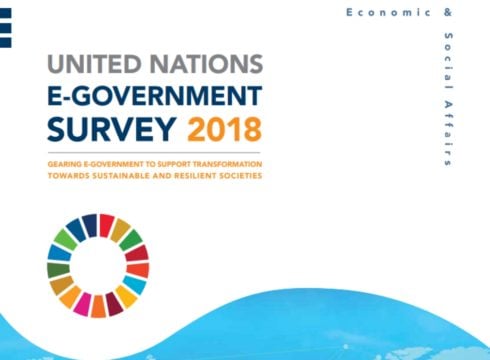SUMMARY
India takes 96 position in the United Nation E-Government Survey 2018, up from 107 in 2016 and 118 in 2014.
India’s Aadhaar program is serving as the basis for interacting with the Government at various levels: Survey.
UN’s survey notes the initiative by India-based non-governmental organisation Janaagraha for its anti-corruption initiative, “I Paid a Bribe”.
Inc42 Daily Brief
Stay Ahead With Daily News & Analysis on India’s Tech & Startup Economy
The UN E-Government Survey 2018 has ranked India at 96 position for its performance in development and execution of information technologies, up from 107 in 2016 and 118 in 2014 —a massive leap over the years.
The survey, published every two years, ranks 193 UN member states on basis of their performance on mainly three dimensions or e-governance development index (EGDI): online service index (OSI), telecommunication infrastructure index (TII), and human capital index (HCI).
UN carried out this year’s survey with the theme “gearing e-government to support transformation towards sustainable and resilient societies”.The survey is aimed at serving as a development tool for countries to identify areas of strength and challenges in e-government and shape their policies and strategies.
For the survey purpose, UN ranked countries scoring greater than 0.75 as Very High EGDI, between 0.50 to 0.75 for High EGDI, between 0.25 to 0.50 for Middle EGDI, and less than 0.25 as Low EGDI. In the EGDI e-Participation Index (EPI), India emerged in the Very High-EGDI group in UN’s E-Government Survey 2018. The country scored 0.9514 in OSI, 0.2009 in TII, and 0.5484 in HCI.
Overall, India’s scored 0.5669 in United Nation E-Government Survey 2018 which ranked India at 96 position.
Some Highlights From The UN E-Government Survey 2018
- 176 countries provide online services in education via email alerts to citizens compared to 88 countries in 2016, and 152 countries provided such services in the health sector this year compared to 75 in 2016.
- The survey noted India’s Aadhaar program is providing digital identity to the entire population and is serving as the basis for interacting with the Government at various levels. Most Indian States have now enrolled more than 80 per cent of their residents.
- This (Aadhar program) provides a unique opportunity for governments to increase digital identity registrations and improve socio-economic outcomes, the survey said.
- In India, the government created the National Optical Fiber Network in 2011 to connect all 250,000 villages (Gram Panchayats) with fixed-line broadband.
- In the South Indian province of Kerala, fishermen are using their mobile phones to get price information on what different markets would pay for their catch. Fishermen’s profits improved by 8%.
The survey also noted how India-based non-governmental organisation Janaagraha supplanted the role of government in rooting out corruption with its anti-corruption initiative, “I Paid a Bribe”. It reports on its website about the nature, number, pattern, types, location, frequency and monetary value of actual corrupt acts in specific locations.
The information is then used to advocate changes in governance and accountability processes, as well as to confront particular incidences of corruption. That initiative is now in use in several other countries.
Note: We at Inc42 take our ethics very seriously. More information about it can be found here.


